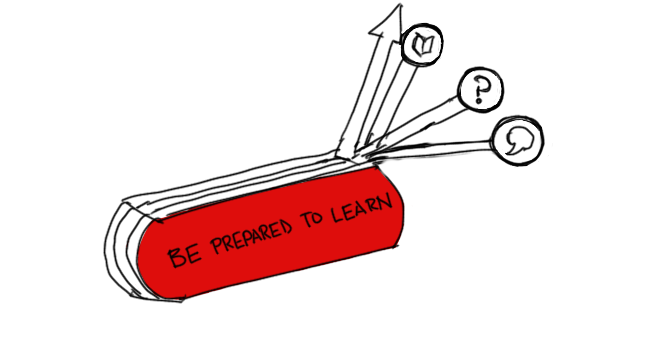You can make learning new software your superpower
INTRODUCTION
Suppose through some freak accident you’re cryogenically frozen. You’re thawed out 10 years later and the lawsuit against the cryogenics lab doesn’t pan out.
No one wants to get left behind...
Now you have to restart your career. How comfortable are you that your skills will get you a job? Doesn’t sound appealing, does it?
In most professions, if you are not learning new skills, you might as well be a human popsicle waiting for defrosting. The world moves fast and can leave you behind.
Your job probably requires some sort of software. Even if it doesn’t, you could likely improve your performance if you found the right software.
Having to learn new technology might intimidate you. That makes sense, because learning is about being uncomfortable. We can sometimes confuse our inability to do things in with our sense of skill and competence.
AWASH IN LEARNING
The amount of new software (and updates to existing software) released every year is staggering. The demand for us to learn how to use it well is growing along with it. Thus, one of the most important (and portable) skills you can have is the ability to learn how to use software as quickly as possible.
We invest a lot of money and time in resources that teach us how to use software. But few people invest in the art of learning itself.
Learning to learn is an umbrella skill that will affect every other thing you take up. By becoming a better learner, all the time and resources you invest will be more useful and better spent.
FORCE MULTIPLIER OF LEARNING
Learning is a meta-skill, or a skill that impacts all your other skills. Becoming a better learner is like a carpenter taking care of their tools. Sharpening your saw doesn't make a cabinet appear magically. But it does make the act of woodworking safer, quicker, and more likely to be a success. I can't stress enough the importance of you sharpening your saw.
THE BASICS OF LEARNING TO LEARN
Like most other skills, you can teach yourself to learn. Here are some basics to improve how you learn software:
- Have a clear goal in mind: Knowing why you want to learn a skill will focus your efforts on the right instruction. It will keep you motivated to power through discomfort. It will also help you ditch the unimportant.
- Break the skill down: Understanding the pieces of the skill allows you to practice each one individually. This careful, measured practice improves your skills.
- Pick a project: One of the most useful tools you can use for bettering your practice is having a specific project you are working towards. This keeps your efforts concrete which puts which are learning in the context. If you're just memorizing commands (and not attaching them to something real you care about) they won't stick with you.
- Be compassionate: Forgive yourself for the difficulty you experience working with the new software. Expect that you will have some challenges along the way. You don't mock children when they have trouble moving from crawling to walking (I hope). So why should you feel bad about yourself when learning how to use a new piece of software?
- Give yourself with the vocabulary needed to ask the right questions: Knowing what to ask when you get stuck makes life easier. When you can use the right terms, you get better help from the support prompt, Google, or people who know the software already.
THE FORGIVENESS EFFECT
Kids don’t worry about not knowing things. Not knowing things is part of being a kid. That gives them a power that we adults don’t have.
Us adults are used to being competent and knowing the things we do. The percentage of our activities that are new is small compared to the novelty children find daily. That’s why we don’t learn as fast.
We get caught up in our view of ourselves and what we should know and how easy things seem like they should be. We need to be more like children to get there. That starts with compassion for yourself and forgiveness.
Forgiving yourself for not knowing pivot tables frees you to figure out how pivot tables work. That's way more useful than worrying whether someone is going to notice your Excel inexperience.
Setting up a learning process that includes compassion and forgiveness will free you to learn with curiosity and light, rather than fear and frustration.
TREATING LEARNING AS A SYSTEM
Efficiency is important when resources are scarce. Your time is scarce, so you want to learn skills quickly.
But there is another resource that is sometimes even more precious for adult learners: patience. If you exhaust that, you won’t be able to learn, no matter how hard you try.
Building a system of learning that makes progress without exhausting your patience is critical for your success. Make decisions about what is practical and how you will try to achieve it. Do it in a way that won’t force you to quit before you’ve reached your goal.
FOR THE LOVE OF THE GAME
I'm a big believer that everyone should their embrace the power of learning. It's not something that comes naturally to us. It takes some time to get used to it. But once you've embraced the curiosity and childlike wonder of learning so many more things are possible.
I used to think adults couldn’t learn the way children can, but I realize that’s not true. We can. But we opted out of that path because we get caught up in how we see ourselves. We fear that the world expects us to already know what we're doing.
By building a forgiving framework that teaches you to embrace the art of learning, you'll learn with the wonder of a child learning to read, speak, or walk. That fast growth spills into your career and personal goals immediately.
PREPAREDNESS
By finding that comfort to learn, and applying it to new software and technology, you’ll find a new level of understanding and skill.
New technology doesn't need to intimidate you anymore. Embrace it and learn your skills.. This is something that can be over, and easily with the right process of learning.
ONE LAST THOUGHT
There is a lot more to learn about learning software faster. I’m developing a course that teaches people some of these strategies in depth. If you would like to learn more about the course and get updates on development, sign up for the newsletter here.



